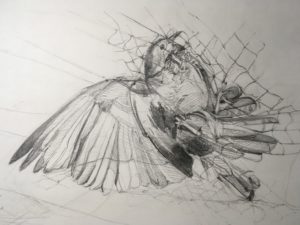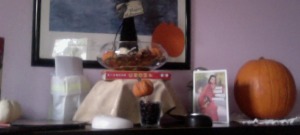The Earth’s a big blue marble when you see it from up there
The sun and moon declare her beauty’s very rare.
Big Blue Marble theme song
It’s a little over two miles from where we parked to the end of canal. With sunny skies and a brisk breeze at our backs, we set out for the farthest point on the Cape Cod Canal path. A few cyclists, the odd fisherman, and a handful of other walkers shared this extraordinary place and time with us.
A cormorant fanned her wings, standing on a seaweed covered rock; seagulls caught updrafts, skillfully hovering in place. Almost invisible sparrows emerged from the sea grass just a few feet away from us. We left the Sagamore bridge at a bend in the path before we could see the beacon that marked the path’s end. Spiderwebs filled the spaces between the breakwater rocks, sheltered from the ocean currents, blowing sands, and gusting wind.
We spoke a few words out on the breakwater, sharing a few amazing particulars in the vast beauty of ocean, sky, and land. Most of the time, we listened to the wind and water, two small creatures keeping silent before the mystery of nature.
On the walk back, we gathered up the pieces of our everyday life we’d left along the way. Lunch ideas, guesses on when we would get back to the car, and afternoon plans were reclaimed as the bridge and traffic sounds reappeared. The couple of hours spent walking settled into place, a piece of the day among other pieces. Time moved us along its path.
But our walk wasn’t just a way to get from one point to another, and it wasn’t just a photo opportunity – nothing so common as either of these. When the blindness that prevents us from seeing the beauty of this place is healed, when we know we are a part of Life’s story, and when we bow down in gratitude for our small and fleeting part in it? It’s a walk in Eden and a glimpse of heaven.
I am grateful beyond words.


